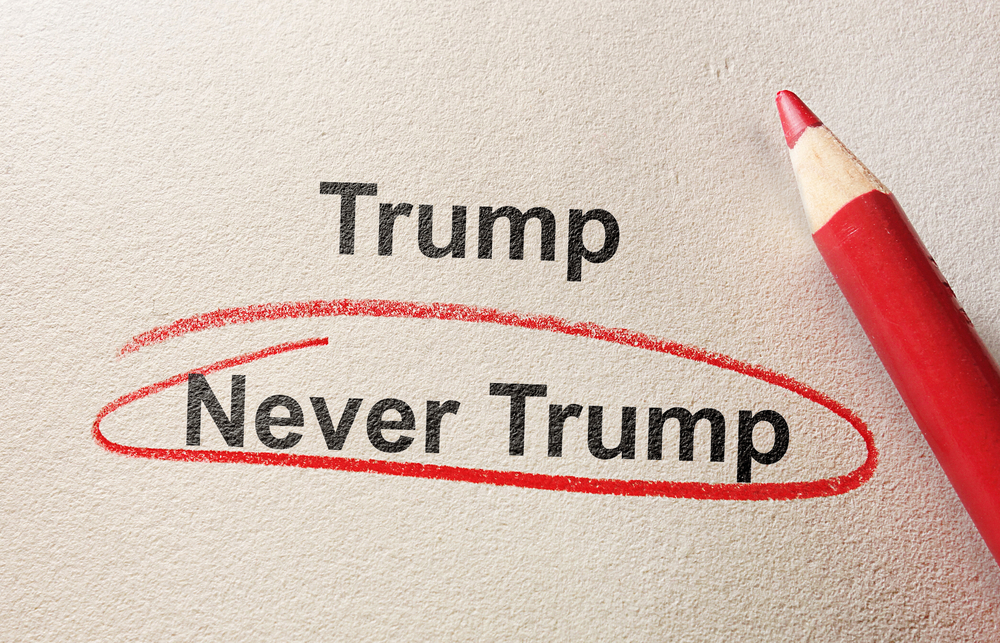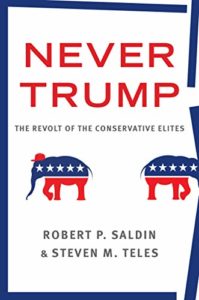Intellectuals Caught in the Middle
By Arnold Kling


- Trump crushed his challengers in the New Hampshire primary, leading to widespread panic among many elite conservatives, and the birth of the #nevertrump hashtag that would give the anti-Trump movement its name. Yet Republican primary voters weren’t paying attention. Despite overwhelming opposition to Trump among the conservative intellectual elite, Republican voters had their own ideas of what the party should be about.
- —Robert P. Saldin and Steven M. Teles, Never Trump: The Revolt of the Conservative Elites,1 page 135
The success of Donald Trump in his run for the Presidency in 2016 surprised and dismayed many conservative intellectuals in the Republican Party. In Never Trump, Robert P. Saldin and Steven M. Teles describe their plight.
What role should intellectuals play in our political system? Conservatives have difficulty answering this question.
For progressives, intellectuals are the technocrats who design and implement policies on behalf of a public that must defer to their scientific and technical expertise. Progressive intellectuals are optimistic that the public will support them in their efforts, as long as people are not fooled or blinded by right-wing opposition.
For libertarians, intellectuals are the philosophers who continually remind people of the intrinsic and practical value of individual liberty. Libertarian intellectuals are optimistic that people will be receptive to the message that freedom is a natural entitlement and economic prosperity comes from voluntary exchange.
For conservatives, intellectuals are the realists who take into account the ignorance and moral weaknesses that characterize all human beings, themselves included. Conservative intellectuals are pessimistic that such imperfect people will form a well-ordered society in the absence of strong social norms and well-established institutions.
Conservative intellectuals have an uneasy relationship with the typical Republican Party voter. But until 2016, they always played a role in Republican election campaigns and Republican Administrations.
For Saldin and Teles, an important role for conservative intellectuals is what they call “system maintenance.” This means keeping open lines of communication between the two parties and lowering the emotional temperature of the political process.
- That sort of system maintenance is becoming ever more of a sacrifice, as the Democratic Party moves sharply to the left and the Trump administration (surprisingly for some) delivers major policy victories to conservatives… Conservatives disgusted with Trump are being asked to give up quite a lot in policy terms in opposing him—something that critics on the left rarely appreciate sufficiently. (page 8)
Saldin and Teles examine the plight of various groups of conservative intellectuals. National security professionals work in foreign policy. Political operatives work on election campaigns. Public intellectuals work in the media. Lawyers and economists work on domestic policy, regulation, and the judiciary.
Conservative national security professionals had the weakest attachment to the Republican Party and the greatest belief in the vital role played by the United States in maintaining the global order. This put them in direct conflict with Trump’s nationalism, and many of them never reconciled with him.
- Eric Edelman, a GOP foreign policy veteran-turned-Never Trumper, remembers a prescient offhand remark made by his former boss, President George W. Bush: “You don’t have to scratch very deep in the Republican Party to hit a pretty deep vein of xenophobia and protectionism and isolationism. My job as party leader is to push back against that.” (page 24)
Before November, opposition to Mr. Trump could be thought of as having little cost. Because no one expected him to win, the question for intellectuals was how best to position themselves for the aftermath of his defeat.
- Never Trump was conceived of as a kind of party in exile, which, free of the stench of Trump’s failure, could rebuild the party in his wake. (page 52)
After the election, most of the other elites grew quiet. But several of the national security professionals remained publicly opposed to working with the new administration.
For some party professionals, Mr. Trump threatened a longstanding objective of broadening the Republican Party’s appeal to include young people and minorities.
- In their professional assessment, demographic trends were a ticking time bomb for the party. As the country became increasingly diverse, they maintained, the Republican coalition would inevitably shrink, making it progressively harder for the party to win national majorities. In response, they felt a profound sense of urgency to diversify the party through aggressive outreach to new demographic groups that the party struggled with but that had the potential to be brought in the fold. (page 72)
These professionals fear that Mr. Trump’s victory will make it less likely that Republicans will pursue an inclusive strategy, and therefore the party will suffer in the long run. But as of now there is no upside for them in positioning themselves against Mr. Trump.
Many conservative public intellectuals were dedicated to a mission of keeping unpalatable elements of the movement at a distance.
- The half-century-long effort to hold back the racist, nativist, anti-Semitic, and conspiratorial parts of the right was being, once again, tested… George Will forthrightly observed of Trump in the summer of 2015 that, “He is an affront to anyone devoted to the project William F. Buckley began six decades ago with the founding in 1955 of National Review—making conservatism intellectually respectable and politically palatable.” (page 141)
Conservatives and Republicans are forever being characterized in the media as fascists, racists, and so on. In response, one group of conservative intellectuals tries to appear particularly refined, and in the process they may come across as defensive. Saldin and Teles point out that another faction
- … focused on conservatism as a group—an oppressed identity in a society dominated by liberals… It is self-consciously pugilistic and sees the other camp of conservatives as too effete to fight… (page 145)
Saldin and Teles point out that electronic media have promoted the latter school of conservatives.
- The populist conservatives depend, in a way that elite conservatives do not, for their daily bread on interacting with and getting paid by a mass base of those on the right.
- … many elite conservatives draw their sustenance from organizations generally controlled by the center-left, such as newspapers, magazines, and universities. As a consequence, the legitimacy of conservatism outside of the right is of paramount concern to them in a way it simply is not to those who preach to the converted… In 2016 that culture of elite conservatism was shown to have been more isolated than anyone had thought (pages 146-148)
Another subset of conservative intellectuals argued for policies that would appeal to working-class and middle-class voters.
- They thought there was something worth conserving in Trumpism and were turned off by what they saw as the snobbish attitudes of other Never Trumpers… The Reformocons thus became… wholly unreconciled to a man they considered to be a dangerous demagogue, but unable to shake the sense that their fellow conservative critics of the president were largely to blame for his rise to power. (page 161)
While libertarian economists rejected Mr. Trump’s protectionism on principle, some conservatives had a more nuanced concern.
- Trump’s populism, some conservative economists fretted, spilled over into trade protection and demagoguing immigrants because it inherently sought out an external cause of individual problems. The conservatism they cut their teeth on, by contrast, was one whose cultural foundation was individual responsibility. (page 227)
In Never Trump, Saldin and Teles have managed to produce a field guide to the various intellectual strands within the conservative movement. Although the authors are consistently hostile to Mr. Trump, their portrayal of the conservative intellectual elites is generally sympathetic.
Do conservative intellectuals have a future? Saldin and Teles acknowledge that the present looks grim.
- Going forward, the dominant faction of the GOP is almost certain to be populist and nationalist and have little space for most of the people who stood against Trump. Yet the populists will not have the party all to themselves. They are going to be forced to share it with what we call a liberal-conservative faction, in recognition of their grounding in classical liberal principles of free markets, pluralism, and constitutionalism. (page 243)
That sounds like a libertarian faction. Unfortunately, I cannot share their optimism that such a faction will play an important role going forward.
Footnotes
[1] Robert P. Saldin and Steven M. Teles, Never Trump: The Revolt of the Conservative Elites. Oxford University Press, 2020.
*Arnold Kling has a Ph.D. in economics from the Massachusetts Institute of Technology. He is the author of several books, including Crisis of Abundance: Rethinking How We Pay for Health Care; Invisible Wealth: The Hidden Story of How Markets Work; Unchecked and Unbalanced: How the Discrepancy Between Knowledge and Power Caused the Financial Crisis and Threatens Democracy; and Specialization and Trade: A Re-introduction to Economics. He contributed to EconLog from January 2003 through August 2012.
Read more of what Arnold Kling’s been reading. For more book reviews and articles by Arnold Kling, see the Archive.
